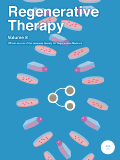
Regenerative Therapy
Scope & Guideline
Transforming discoveries into impactful solutions in regenerative medicine.
Introduction
Aims and Scopes
- Stem Cell Research and Applications:
The journal emphasizes the study of various types of stem cells, including mesenchymal stem cells, induced pluripotent stem cells (iPSCs), and their derivatives in regenerative therapies. - Tissue Engineering Innovations:
Research on developing novel scaffolds, hydrogels, and biomaterials designed to support tissue regeneration and repair, often utilizing 3D printing technology. - Exosome and Extracellular Vesicle Research:
Exploration of the therapeutic potential of exosomes derived from stem cells, focusing on their roles in tissue repair, inflammation modulation, and regenerative processes. - Clinical Applications and Trials:
The journal features studies on clinical trials and applications of regenerative therapies, assessing their safety, efficacy, and outcomes in various medical conditions. - Biomolecular Mechanisms in Regeneration:
Investigation of the molecular and cellular mechanisms underlying regenerative processes, including gene expression, signaling pathways, and the impact of growth factors.
Trending and Emerging
- Advanced 3D Bioprinting Techniques:
There is a growing interest in the application of 3D bioprinting for creating complex tissue structures, allowing for precise control over cell placement and material properties. - Immunomodulatory Properties of Stem Cells:
Research into the immunomodulatory effects of stem cells, particularly their ability to modulate immune responses in various therapeutic contexts, has gained significant traction. - Personalized and Precision Medicine:
An emerging focus on tailoring regenerative therapies to individual patient needs, including the use of patient-derived cells and personalized treatment protocols. - Nanotechnology in Regenerative Medicine:
The integration of nanotechnology to enhance drug delivery systems and create advanced biomaterials for targeted therapies is becoming increasingly relevant. - Regenerative Strategies for Aging-Related Conditions:
There is a notable trend towards investigating regenerative therapies aimed at treating age-related diseases, such as osteoarthritis and cardiovascular conditions, reflecting an aging population's needs.
Declining or Waning
- Traditional Biomaterials:
Research on conventional biomaterials, such as basic collagen scaffolds, has seen a decrease as more innovative and engineered materials gain prominence in the field. - Basic Animal Models:
The reliance on traditional animal models for testing regenerative therapies is waning, with a shift toward more complex models or in vitro systems that better mimic human conditions. - Non-cellular Therapies:
Interest in non-cellular regenerative strategies, such as those solely based on growth factors without cellular components, has diminished as the focus has shifted towards cell-based therapies. - Standardized Protocols:
The emphasis on standardization in stem cell culture and therapy protocols is decreasing as the field moves towards more personalized and patient-specific approaches. - Historical Review Articles:
There has been a noticeable reduction in the publication of review articles focused solely on historical perspectives of regenerative medicine, with a preference for contemporary analyses and future directions.
Similar Journals

Stem Cells International
Pioneering Discoveries in Cellular RegenerationStem Cells International is a premier open access journal published by HINDAWI LTD, focusing on the rapidly evolving field of stem cell research. With an ISSN of 1687-966X and E-ISSN 1687-9678, this journal has been a vital resource since its inception in 2010, showcasing innovative studies and breakthroughs up to 2024. Positioned in Q3 in Cell Biology and Q2 in Molecular Biology for 2023, as well as well-ranked in the Scopus database, the journal serves as an essential platform for researchers, professionals, and students dedicated to exploring the implications of stem cell technology in regenerative medicine and biological research. The open access model ensures wide accessibility, fostering collaboration and knowledge-sharing across the scientific community, making it a cornerstone in advancing the understanding and application of stem cell science.
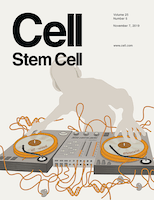
Cell Stem Cell
Unraveling the Mysteries of Stem Cells for a Healthier TomorrowCell Stem Cell, published by CELL PRESS, is a premier journal at the forefront of cellular biology, genetics, and molecular medicine. With an esteemed impact factor and recognized as a Q1 journal in multiple categories including Cell Biology, Genetics, and Molecular Medicine, it offers researchers, professionals, and students rigorous, peer-reviewed articles that shape the future of stem cell research and regenerative medicine. Located in Cambridge, MA, this journal has become an invaluable resource since its inception in 2007 and is committed to disseminating groundbreaking findings that drive innovation and understanding in these critical fields. By consistently ranking within the top percentile of its categories in Scopus, Cell Stem Cell remains an essential platform for scholarly communication, fostering collaboration among leading scientists worldwide. Although the journal does not currently offer open access options, its comprehensive insights are pivotal for anyone engaged in the study of stem cells and their applications.

Tissue Engineering and Regenerative Medicine
Innovative Insights for the Future of Regenerative MedicineTissue Engineering and Regenerative Medicine, published by the Korean Tissue Engineering Regenerative Medicine Society, is a distinguished journal focusing on the interdisciplinary fields of tissue engineering, regenerative medicine, and related biomedical innovations. With an ISSN of 1738-2696 and an E-ISSN of 2212-5469, this journal disseminates cutting-edge research and advancements pivotal to developing therapeutic strategies that improve tissue function and repair. As a testament to its scholarly impact, it holds a Q2 ranking in both Biomedical Engineering and Medicine (miscellaneous) categories, reflecting its influence and relevance within the scientific community, particularly with a Scopus rank placing it in the 82nd percentile among similar journals. Although the journal does not offer open access, it provides vital insights and knowledge to researchers, professionals, and students involved in the quest for innovative solutions in medical science and engineering. With its convergence years extending from 2008 to 2024, the journal continues to be an essential platform for the dissemination of high-quality research that drives the field forward.
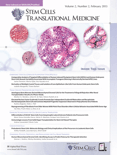
Stem Cells Translational Medicine
Advancing the Future of Regenerative MedicineStem Cells Translational Medicine, published by Oxford University Press, is a leading open-access journal that has been at the forefront of stem cell research since its launch in 2012. With an impressive impact across various categories, it occupies Q2 in Cell Biology and is highly recognized in Q1 for both Developmental Biology and Miscellaneous Medicine in 2023. Its strong Scopus rankings highlight its significance in the fields of Biochemistry, Genetics, and Molecular Biology, achieving an outstanding percentile ranking of 93rd in Developmental Biology. The journal provides a pivotal platform for researchers, professionals, and students to publish and access cutting-edge findings that contribute to the understanding and application of stem cell technology. With a commitment to disseminating high-quality scientific knowledge, Stem Cells Translational Medicine plays a vital role in advancing research and innovation within the rapidly evolving landscape of regenerative medicine.

Stem Cell Research & Therapy
Empowering Innovation in Stem Cell ScienceStem Cell Research & Therapy is an esteemed international journal published by BMC, specializing in the rapidly advancing fields of stem cell research and regenerative therapies. Since its inception in 2010, the journal has embraced an Open Access model, ensuring that vital research is readily accessible to a global audience. With a significant impact in the scientific community, it holds Q1 quartile rankings in prestigious categories such as Biochemistry, Genetics and Molecular Biology, Cell Biology, and Molecular Medicine, highlighting its critical role in promoting groundbreaking research. The journal’s high Scopus rankings—placing it in the top echelons of its fields—reflect its commitment to publishing high-quality, peer-reviewed studies that advance our understanding of stem cell biology and therapeutic applications. Aimed at researchers, healthcare professionals, and students alike, Stem Cell Research & Therapy is an indispensable resource for those dedicated to the exploration and innovation within this transformative area of science.

Journal of Orthopaedic Translation
Bridging the gap between science and surgery for better health.The Journal of Orthopaedic Translation is a leading peer-reviewed publication dedicated to advancing the field of orthopedics through innovative research and clinical implications. Published by Elsevier and available as an Open Access journal since 2013, it ensures that cutting-edge insights and findings are accessible to a global audience, promoting collaboration and knowledge sharing among researchers, professionals, and students. With an impressive impact factor, the journal has achieved a remarkable Q1 ranking in the categories of Orthopedics and Sports Medicine, placing it in the top 1% of journals in this highly specialized field. As of 2023, it ranks #5 out of 321 in conjunction with a notable 98th percentile achievement in Scopus Ranks, underscoring its reputation for excellence and relevance. Through a focus on both basic and applied research, the Journal of Orthopaedic Translation aims to bridge the gap between laboratory and clinical practice, contributing significantly to the evolving landscape of orthopedic health. Join us in exploring the transformative studies shaping the future of patient outcomes and surgical interventions.

CYTOTECHNOLOGY
Elevating Science: Bridging Concepts and Applications in Cytotechnology.CYTOTECHNOLOGY, an esteemed journal published by Springer, stands as a vital resource in the fields of Bioengineering, Biomedical Engineering, and Biotechnology. With an impact factor reflective of its solid position within academia, this journal encompasses a broad scope dedicated to the advancement of cytotechnological research and applications from its inception in 1987 through to its latest volumes in 2024. Based in the Netherlands, it is committed to providing researchers, professionals, and students with high-quality, peer-reviewed articles that contribute to the understanding and innovations in cytotechnology. Although currently not open access, CYTOTECHNOLOGY has garnered a commendable reputation, holding Q3 rankings in multiple categories, indicating its relevance and influence within the scientific community. Researchers are encouraged to submit their cutting-edge findings to share insights that can spark further advancements in this dynamic field.
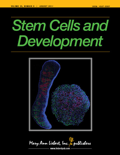
STEM CELLS AND DEVELOPMENT
Fostering Collaboration in Cutting-edge ResearchSTEM CELLS AND DEVELOPMENT, published by Mary Ann Liebert, Inc., is a leading peer-reviewed journal dedicated to the rapidly advancing fields of stem cell biology and developmental science. With an ISSN of 1547-3287 and an E-ISSN of 1557-8534, the journal encompasses a broad range of topics central to understanding stem cells' roles in development and regeneration processes. It holds a prestigious standing within its category quartiles, ranking Q3 in Cell Biology, Q2 in Developmental Biology, and Q2 in Hematology for 2023. With its convergence from 2004 to 2024, STEM CELLS AND DEVELOPMENT fosters an innovative platform for researchers, professionals, and students to disseminate groundbreaking research, share insights, and explore novel therapeutic approaches. Open access options enhance the journal's visibility and accessibility, promoting a collaborative exchange of information among the scientific community. Positioned at the forefront of stem cell research and its applications, this journal is vital for anyone seeking to stay informed about the latest advancements and trends within these critical areas of study.
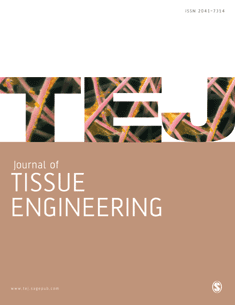
Journal of Tissue Engineering
Pioneering the Future of Regenerative MedicineThe Journal of Tissue Engineering, published by SAGE Publications Inc., stands at the forefront of innovation in the interdisciplinary fields of biomaterials and biomedical engineering. Established as an open access journal since 2010, it has quickly ascended to a leading position, as evidenced by its impressive rankings in 2023: Q1 in Biomaterials, Q1 in Biomedical Engineering, and Q1 in Medicine (miscellaneous). With a current impact factor that underscores its academic influence, this journal provides a vital platform for researchers, professionals, and students to share groundbreaking discoveries and advancements in tissue engineering and regenerative medicine. Located in the United Kingdom, the journal fosters a global dialogue with its robust publications and rigorous peer-review process, contributing significantly to the enhancement and understanding of complex biological systems. Join the esteemed community of thought leaders and innovators shaping the future of healthcare through the Journal of Tissue Engineering.

npj Regenerative Medicine
Exploring Breakthroughs in Regenerative Science.npj Regenerative Medicine, published by NATURE PORTFOLIO, is at the forefront of research and innovation in the field of regenerative medicine, fostering a deep understanding of cellular and molecular processes that can be leveraged for therapeutic advancements. Launched as an Open Access journal since 2016, it ensures wide dissemination of knowledge, allowing researchers, professionals, and students to access high-quality articles without barriers. With an impressive impact, it holds Q1 ratings across multiple categories including Biomedical Engineering, Cell Biology, Developmental Biology, and Medicine (miscellaneous) as of 2023, indicating its critical role in shaping contemporary scientific discourse. The journal ranks notably within the top 10% in multiple Scopus categories, indicating its commitment to publishing pioneering research that addresses pressing challenges in regenerative therapies. Addressing the dynamic convergence of disciplines, npj Regenerative Medicine is poised to not only impact academic thought but also translate into clinical applications, making it a pivotal resource for those invested in the future of medicine.